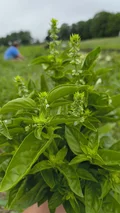TL;DR
We planted winter squash, harvested basil and cilantro, and prepared for market. And I got to drive the John Deere 1140 tractor for the first time.
Just Like That…Weather, Basil, and Tractor Operation
The past two days, and much of last week and the week before, have been hot and bug-filled. On Monday while baiting the deer fence with peanut butter in the lower field, I got swarmed by mosquitoes and greenhead flies. I was wearing long sleeves and pants, but the bugs were still a bit overwhelming. But today while planting in the same field, the weather being much cooler and breezy, in a freshly tilled and slightly damp soil bed, there were no bugs at all. Just like that, conditions for certain activities on a farm change.
The basil has already been seeding up for two weeks, but we’ve been pinching it off before and during harvest. Now it’s full on harvest or loose it time. We’ll probably get another week in the CSA out of it, even if the top leaves are slightly bitter, the rest of the leaves aren’t for some reason and you can make the best kind of pesto with it. So just like that, the basil is pretty much done because it doesn’t keep for long after picking.
I got to till a 300-foot field row for the first time with the big tractor. Jamie had me stand / hold on to the side of the tractor while he drove it and showed me how to operate the various controls. I am from the ’80s and manual transmission was always my first automotive love, as with the throttle on the sit-down lawn mower I grew up on. But the 3-point hitch attachment…the power drive and up/down controls…along with keeping straight to the row was a good amount of things to learn how to balance together at the same time. Just like that, I did what would take dozens of hoes hours to do by hand in minutes.
Things that don’t go ‘Just like that…’
There are many monotonous, tedious, and slow-going activities on a farm that don’t lend themselves to the ‘just like that’ mindset. It’s okay, you get used to them, but the whiplash between hurry up and slow down due to the weather, the seasons, and the unpredictability of nature is definitely part of the learning curve.
Case in point, pinching basil or cleaning up celery plants is a slow process. It took three of us maybe 10 minutes to harvest about 50 plants. It took me about 30 minutes to clean them. You have to…cleaned ones are so much more ready to sell than quickly-rinsed ones, but it’s tedious work. Just like washing eggs, just like planting leggy squash, just like weeding…at least you know there’s something tasty to show for your efforts.
Just Like That, I’m a Farmer
After writing my mind in yesterday’s post about use of broad-spectrum herbicides in organic farming, I’ve been thinking about how hard a line I drew. Yes, I’m only a year into farming, but I’ve been very pro-natural and anti-chemical for at least 15 years of being a gardener and parent.
But I had to ask Jamie about it, why he draws the lines he does on this farm, how he would engage other farmers (or not) about their use of chemicals, and as expected the conversation was more nuanced than my simplistic and junior view. In short, there’s no good discussion you can have with someone about their practices if you come at it abrasively or in an accusatory manner (this, I knew). The best way you can share your views is to listen to theirs, and then show them what you’ve been doing differently and how it might be feasible for them to adopt some of those practices. Organic farming business models are still evolving, and there’s no one-size-fits-all approach.
In this process, I mentioned that I still don’t feel like I can speak as a ‘farmer’ because I’ve only been doing this for a year or so, and I’m still learning the ins and outs of the business. Jamie was quick to point out that I’m already a farmer in my own right, and that my perspective and experiences are valuable contributions to the farm. That was nice to hear.
Just like that, My AI Assistant Loses Its Bullet Points
Today’s automatic summary from my homegrown LLM-driven summarization process seems to be missing the typical bullet point format from the main themes and activities section, using a paragraph format instead. Unlike loosing your marbles, loosing some of your bullet points is not a bad thing, but I don’t have a good answer as to why it happened.
Maybe a more nuanced approach to diagnosing the source of the problem is warranted. If I had the time, this would include:
- Reviewing the prompts and input used (maybe the document splitting didn’t work the same as it has done on other days)
- Re-running the summarization process with the same input to see if the output is consistent
- Adding observable moments (logs, metrics about artifacts, etc.) to the process to see if there are any patterns or trends
- Adding a check for the output format to ensure it matches the desired format
I really don’t have the time for all of this considering this weekend is already full and my homelab backlog is already full. But at least it’s not wildly inaccurate or unusable for today:
AI-generated Summary from Field Notes
Consolidated Summary:
Main Themes:
The intern’s experience on the farm revolves around the ethical and practical challenges of organic farming, the transition from a temporary worker to a reflective farmer, and the balance between environmental sustainability and economic viability. Key themes include the impact of agricultural chemicals (e.g., chlorothalonil) on ecosystems and human health, the complexities of organic farming practices, and the evolving role of the intern in the farm’s operations.
Activities:
The intern engaged in physical labor such as harvesting, sorting, and transporting produce, collaborated with the farmer (Jamie) to discuss farming practices, and wrote a blog post mentioning the effects of chlorothalonil on bees and humans. They also reflected on their role as a farmer, the farmer’s perspective on organic practices, and the broader implications of sustainable agriculture.
New Things Encountered:
- The intern explored the environmental and health impacts of chlorothalonil in herbicides.
- They grappled with how they might adequately handle a conventional farmer’s objections about transitioning to organic methods, including time, cost, and market demands.
- The intern began to question their identity as a farmer, balancing temporary labor with long-term commitment.
- They further considered the challenges of sustaining a farm through organic practices while maintaining profitability.
Questions for Future Research:
- How can the long-term effects of chlorothalonil on bee populations and human health be studied?
- What are the economic and logistical barriers to fully adopting organic farming?
- How can farmers ethically balance environmental goals with the realities of farm profitability?
- How does the intern’s evolving perspective on farming shape their self-identity and future goals?
- What innovative methods can reduce farming’s environmental impact while ensuring productivity?
Suggested Actions:
- Deepen understanding of organic farming through direct collaboration with the farmer and further research.
- Document findings on agricultural chemicals’ impacts to raise awareness within the farming community.
- Explore sustainable practices that align with both ethical and economic goals, such as partnerships or certifications.
- Reflect on the intern’s role in the farm’s future, considering long-term commitments and community engagement.
- Investigate financial models for organic farms to ensure sustainability and scalability.
This summary captures the intern’s journey, the complexities of organic farming, and the broader implications for sustainable agriculture.
Part 1
Main Themes:
- Organic Farming Practices: Focus on the ethical and environmental implications of organic vs. conventional farming.
- Learning and Growth: The intern’s journey in understanding farm operations, the physical labor involved, and their evolving role as a farmer.
- Ethical Considerations: The impact of agricultural chemicals (e.g., chlorothalonil) on ecosystems, bees, and human health.
- Farmer-Intern Dynamics: The intern’s interactions with the farmer, Jamie, and the challenges of aligning perspectives on farming practices.
- Sustainability and Business Models: Balancing organic practices with economic viability and long-term sustainability.
Activities the Intern Performed:
- Physical Labor: Harvesting, picking, sorting, and transporting produce (e.g., basil, cilantro, etc).
- Collaboration with the Farmer: Assisting in farm tasks and engaging in discussions about farming practices.
- Writing and Reflection: Drafting a blog post on chlorothalonil and its impact on bees and human health.
- Research and Discussion: Exploring the ethical and practical implications of organic vs. conventional farming.
- Self-Reflection: Considering their role as a farmer and the challenges of transitioning to a sustainable, organic lifestyle.
New Things Not Yet Encountered:
- Impact of chlorothalonil on Ecosystems: The study on how chlorothalonil in herbicides affects bee populations and human health.
- Nuances of Organic Farming: The farmer’s perspective on the trade-offs between organic practices and economic feasibility.
- Farmer Identity: The intern’s struggle to define themselves as a farmer versus a temporary worker.
- Business Model Challenges: The complexities of sustaining a farm without synthetic chemicals, including time, cost, and market demands.
Questions and Future Areas of Research:
- chlorothalonil and Its Effects: How can the long-term impact of chlorothalonil on bee populations and human health be studied further?
- Organic Farming Viability: What are the economic and logistical challenges of transitioning to fully organic farming?
- Ethical Trade-offs: How can farmers balance environmental concerns with the practical realities of farm profitability?
- Farmer Identity and Role: How does the intern’s evolving perspective on farming influence their self-identity and future goals?
- Sustainable Practices: What innovative methods can be used to reduce the environmental impact of farming while maintaining productivity?
Suggested Actions:
- Continue Learning: Engage more deeply with the farmer to understand the practical and philosophical aspects of organic farming.
- Research and Documentation: Explore scientific studies on the effects of agricultural chemicals on ecosystems and human health.
- Collaborate on Farming Practices: Work with the farmer to develop sustainable methods that align with both ethical and economic goals.
- Write/Share Insights: Publish the blog post or share findings with the farming community to raise awareness about the importance of organic practices.
- Explore Business Models: Investigate how organic farms can sustain themselves financially, perhaps through partnerships, certifications, or community support.
This analysis highlights the intern’s growth, the complexities of organic farming, and the broader ethical and practical challenges faced by farmers.
[end of post]
Enjoy Reading This Article?
Here are some more articles you might like to read next:





